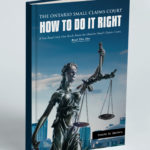I was reading the local newspaper up here in Newmarket and was dismayed to find out that a Town of Newmarket By-Law Enforcement Officer served notice to a group of kids playing, of all things, street hockey.B If they were ever charged for the “crime” of street hockey, would it stand up in court?B I say no.B I believe the by-law to be unconstitutional.
Here is the by-law:
Playing on Roadways Prohibited
12.1B No person shall play or take part in any game or sport on a roadway or designated bike lane.
The above by-law, in my opinion, violates Section 7 of the Charter of Rights and Freedoms and Section 1 of the Charter, in limine (“on the threshold”).B Here are those two sections from the Charter:
Section 1–The Canadian Charter of Rights and Freedoms guarantees the rights and freedoms set out in it subject only to such reasonable limits prescribed by law as can be demonstrably justified in a free and democratic society.
. . . .
Section 7–Everyone has the right to life, liberty and security of the person and the right not to be deprived thereof except in accordance with the principles of fundamental justice.
. . . . .
So, what does that mean?B Part of s. 7 of the Charter includes a concept called “The Doctrine of Vagueness.”B In that doctrine, there has to be a) fair notice to the citizen; b) a limitation of the law enforcement discretion; and,B c) the scope of precision in the law that helps determine if a particular law is vague.
Another concept is called “Over-breadth.”B It is a part of the Doctrine of Vagueness in that if a law is considered to be not vague, then the prohibition is grossly disproportionate to the state interest the legislation seeks to protect.B Over-breadth is a part of fundamental justice.
The words of the Supreme Court of Canada in R. v. Nova Scotia Pharmaceutical Society provide the general guideline:
“The doctrine of vagueness can therefore be summed up in this proposition: a law will be found unconstitutionally vague if it so lacks in precision as not to give sufficient guidance for legal debate.”B (pg. 44)
How does this relate to s. 1 of the Charter? The test is from R. v. Oakes where it asks two questions:
- Is the legislative objective in limiting the Charter protected right a pressing and substantial objective according to the values of a free and democratic society?
- Is the legislative objective and the means used to further that objective proportional so that it is reasonable and demonstrably justified which means:
- the measures adopted are carefully designed to achieve the objective, and is not arbitrary, unfair, or irrational;
- even if it is rational to limit a Charter right, it does so minimally; and
- the effects of a legislative limit on a Charter right are proportional to the objective that is of “sufficient importance.”
The Newmarket by-law on street hockey is too vague.B There should be signage in the town stating the by-law,B as is the case in some parts of the City of Toronto.B There is no discretion for a by-law officer to use; there is too much of a straight line between a conviction andB the decision to prosecute.B It leaves the accused with no room to defend themselves.
There are not enough boundaries in the by-law that foster legal debate.B It does not introduce boundaries outside of outright prohibition.B It does not show an “area of risk” that allows citizens to take substantive notice.
The by-law makes no distinction between Davis Drive, a multi-lane, high-traffic thoroughfare, and Seneca Court, a quiet cul-de-sac.
Finally, if you consider s.1 of the Charter, an outright ban on play, games, and sport on all of our town roadways is not minimal.B It bears no relation to the assumed objective of children’s safety.B It is arbitrary and unfair.
That is why the by-law is unconstitutional.


hi to all http://www.smbparalegal.comers this is my first post and thought i would say a big hello to yous –
thanks speak soon
garry moore